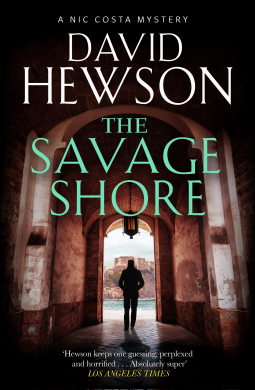The Savage Shore, by David Hewson
Genre: crime fiction / detective series
Publisher: Black Thorn
Release Date: May 2, 2019
(This has been previously published. I’m a little unclear on this, but it appears to have been published by a different publisher and under a different ISBN last year. Maybe in Europe?)
Many thanks to Black Thorn, David Hewson, and Netgalley for letting me read this book in exchange for an honest review.
Summary of The Savage Shore:
On Italy’s Calabrian coast, the savage ‘Ndrangheta rule. Other mafia families rule other areas, but the Calabrian coast, with its poverty and savagery, is the ‘Ndrangheta’s and has been for centuries. Their reach is almighty and powerful, their influence evident to everyone, including the police. Yet the mysterious head of this organization, Lo Spettro (“the ghost”), has offered to turn state witness and deliver the head of rival crime organizations to the police. Why?
Detective Nic Costa and his team go undercover, posing as business people on vacation while they wait for Lo Spettro to make contact with them. And wait. And wait. Because this is Lo Spettro’s game and he–unseen, unknown–is calling the shots. Waiting along with him are Teresa Lupo, Silvio, her deputy; Peroni, her older colleague and lover; Falcone, his inspector; and Rosa, another colleague.
Then Lo Spettro makes a deal. He needs one of them. Nic goes undercover again, this time joining the ‘Ndranghetas as a long-lost Bergamotti family member, and finds himself deep in wilderness of the Calabrian coast, surrounded by the mafia. The only people who know his true identity are Lo Spettro’s grown children, Rocco and Lucia Bergamotti, and, of course, Lo Spettro himself. Nic can’t let his guard slip. One mess up, and not only is the deal with Lo Spettro over, but his life as well.
My thoughts:
When I requested this on Netgalley, I wasn’t certain this was a good choice. I’d never read David Hewson’s work, wasn’t certain if jumping midway into a series was a terrific idea, and wasn’t sure if the premise even appealed to me. Organized crime in fiction is a bit hit or miss with me.
The Savage Shore was a delight to read, and I’ll be looking for more books by David Hewson. Here’s why:
The quality of the writing is superb.
Hewson is a gifted writer who has honed his craft. It’s obvious. Every sentence, every detail, every word is chosen with care. There was one passage that was incredibly beautiful and as I copied it into my notes, I wrote, “Beautiful. I want to explicate it in a paper.” (I love dissecting literature, and it’s never diminished my joy in the story.) It’s literary quality, but it’s never boring or pointless. You can read and re-read this book, and even after knowing the plot twists, you’ll discover some new aspect that you hadn’t seen before.
The characterizations are rich and deep.
Peroni is one of my favorite characters in the book. Because of a long-ago mistake, he has lost rank in the police. But he is still a terrific detective, skilled at reading people, and perceptive. “There was too much staring at blinking screens, too little staring into people’s faces,” he thinks (part 2), and he spends his time looking into people’s faces. He has compassion, insight, and internal conflict about the team’s deception, as well as long experience with criminals, and based on experience, he is apprehensive about whether their mission will be accomplished. Whether it even can be accomplished. He became a character I cared about.
The same could be said for all the characters, and that includes the “bad” ones. Hewson creates characters who are complex, inclined toward good or evil but capable of either. The police team has stepped outside of the official legal system and into the playing field of the mafia. As Peroni warns,
“We’re as bad as them. Sometimes they can be as good as us. It’s not black and white anymore” (Part 2).
The plot twists are unexpected.
Hewson’s twists are surprising but in retrospect, they make sense. The clues are all right there–I should have seen them–but I didn’t because of how well hidden-in-plain-sight they are. Suspense writers (and writers in general) can learn a lot from his techniques.
Speaking of plot, this is one that initially appears to move slowly. (Note the word appears.) Each of the seven sections opens with a selection from the “Calabrian Tales,” ostensibly written by Lo Spettro’s grandfather. These parts may seem irrelevant, but they do connect with the Nic Costa story.
Hewson kept me turning pages. I never wanted him to hurry up and get on with it, as I have with other novels. Instead, I hung onto every word. He strikes the right balance between action, dialogue, and description. Everything serves to move the story forward.
Every moment is filled with tension. Nothing’s wasted.

